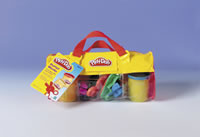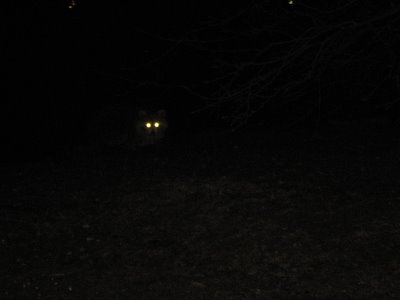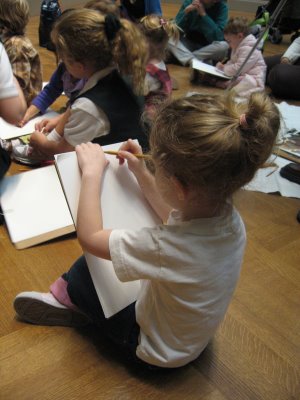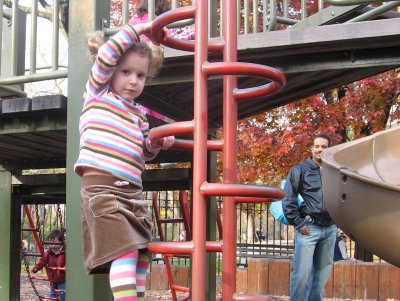Sunday, December 31, 2006
Humility
At long last, I have finished Andrew Murray's little book, Humility. It is well worth reading slowly and re-reading.
Reading Andrew Murray is unlike reading most contemporary authors. In writing, he assumes that Christianity that is not experiential is not real Christianity. So he is after truth, and deep personal experience of that reality.
That is the context in which he casts humility: It is our being nothing before the God who is everything. It is the experience of Him being all in all.
Whereas many authors take our fallen condition as the ground for humility (i.e. God is holy, and we are sinful), Murray takes a step further back. He argues persuasively that humility is part of the creation order. In God's design before the Fall, we were to be utterly dependent on Him:
But as God is the ever-living, ever-present, ever-acting One, who upholds all things by teh word of His power, and in whom all things exist, the relation of the creature to God could only be one of unceasing, absolute, universal dependence. . . . Humility, the place of entire dependence on God, is, from the very nature of things, the first duty and highest virtue of the creature. In fact, it is the root of every virtue. . . . Hence it follows that nothing can be our redemption but the restoration of the lost humility, the original and only true relation of the creature to its God. And so Jesus came to bring humility back to earth, to make us partakers of it, and by it to save us (12, 13).
What is this humility?
It is not something which we bring to God, or which He bestows; it is simply the entire nothingness which comes when we see how truly God is ALL, and in which we make way for God to be ALL (14).
Murray clarifies what he means:
If this leads us to utter despair of ever conquering or casting [pride] out, it will lead us all the sooner to that supernatural power in which alone our deliverance is to be found - the redemption of the Lamb of God (19).
With rich metaphors, Murray communicates the ways of God:
Just as water ever seeks and fills the lowest place, so the moment God finds the creature abased and empty will His glory and power flow in to exalt and to bless (36).
The humility that Murray puts forth is not that of the hermit:
Our humility before God has no value except as it prepares us to reveal the humility of Jesus to our fellow men (49).
Though he sees humility as a creation order, Murray speaks insightfully to humility in sinfulness:
It is not sin, but grace that will make me indeed know myself a sinner, and make the sinner's place of deepest self-abasement the place I never leave. . . . It is the revelation of God, not only by the law condemning sin but by His grace delivering from it, that will make us humble. . . . Not to be occupied with your sin, but to be occupied with God, brings deliverance from self (68, 69, 70).
Amidst all the wisdom that Murray offers, there was one insight that has more shaken me than any other: Grace not only can come at the cost of my pride; it comes only at that price. The only way to seek grace is to seek humility, that God may be ALL; for God opposes the proud but gives grace to the humble.
I have many times prayed for God to draw me to Himself in ways that didn't humble me. Now I am beginning to see the folly of those requests, and why He wisely gives grace only to the humble.
Posted by
Graham
at
2:34 PM
0
comments
![]()
Labels: Book Reviews, Quotables, Theology
Saturday, December 30, 2006
Reading with Uncle Frank
Posted by
Graham
at
10:36 PM
0
comments
![]()
Labels: Photos
The Glory of Christ
 John Piper first introduced me to John Owen, and I saw that there was a tremendous depth to him. However, I consistently heard people say that he was difficult to read, so I didn't tackle an entire Owen book until my friend Dylan sent me The Glory of Christ.
John Piper first introduced me to John Owen, and I saw that there was a tremendous depth to him. However, I consistently heard people say that he was difficult to read, so I didn't tackle an entire Owen book until my friend Dylan sent me The Glory of Christ.
For those who are intimidated, be assured that the riches far outweigh the difficulty of reading, which is not really that bad. Once you've read a chapter or two, you get used to his language, and many of the archaic words are defined in the margin.
The entire book is an explication of John 17:24, "Father, I desire that they also whom You gave me may be with me where I am, that they may behold my glory which You have given me."
No man shall ever behold the glory of Christ by sight hereafter, who does not in some measure behold it by faith here in the world. Grace is a ncessary preparation for glory, and faith for sight. Where the subject (the soul) is not previously seasoned with grace and faith, it is not capable of glory or vision (45).Owen develops this claim. Seeing the glory of Christ by faith is our salvation in this world, and is preparation for being where He is and seeing His glory. With powerful clarity, Owen makes the case that seeing the glory of Christ is the only way to die well:
And this is the advantage we may have in [gazing on the glory of Christ] . . . with respect to death itself: it is the assiduous contemplation of the glory of Christ which will carry us cheerfully and comfortably into it, and through it (31).I have never come across one who so clearly and succintly teaches believers how to prepare for death. Yet he is not speaking merely of mystical experience:
No man can by faith take a real view of this glory, but virtue will proceed from it in a transforming power to change him 'into the same image' (2 Cor. 3:18) [50].Since his contention is that our salvation is to see the glory of God in the face of Christ, now as in a glass, and then face to face, he spends a great part of the book setting forth the beauties of Christ in his person and office. One cannot look for a more living and vibrant treatment of the two natures of Christ than Owen provides. It is quite clear that in writing, Owen is doing precisely that to which he is calling his readers: to look long and hard at the beauty of God in Christ.
If you're afraid at this point that Owen is terribly erudite and hopelessly beyond addressing the realities of life in this world, rest easy: Part 2 of the book is devoted to "Application of the Foregoing Meditations Concerning the Glory of Christ." Owen is unparalleled, in my experience, in giving counsel to those who are strangers to Christ, those who are faltering, and all of us who pass through seasons of darkness. I happened to be reading When the Darkness Will Not Lift by John Piper (which I thought was a good book; you can read my review here) while I was finishing up The Glory of Christ. As highly as I regard Piper (which those who know me well can tell you is very highly), Piper's writing is as a school-boy compared to Owen for precision, force and wisdom in going through darkness.
If you would see more of Savior, and love Him more, I heartily recommend to you this book. It will lift your eyes to the Son of God, and fix your gaze there in ways that will transform you into His likeness, and prepare you well to spend all eternity gazing on His beauty.
Note: After publishing this, I ran across two recommendations for Owen on johnowen.org that capture well my feelings:
To read John Owen is to enter a rare world. Whenever I return to one of his works I find myself asking “Why do I spend time reading lesser literature?” —Sinclair B. Ferguson
I owe more to John Owen than to any other theologian, ancient or modern; and I owe more to [The Mortification of Sin] than to anything else he wrote.—J.I. Packer
Posted by
Graham
at
8:06 AM
3
comments
![]()
Labels: Book Reviews, Quotables, Theology
Friday, December 29, 2006
May - can I have that, please?
Elisabeth is getting better and better at using please in her requests without being prompted. However, she still often says can when may is the appropriate word. So when she asks, "Can I have that?" I tell her, "Please say: 'May I please have that?'"
She is getting the sense that may ought to be part of her request, but hasn't yet realized that it replaces can, so many of her requests go like this:May - can I have that, please?
Posted by
Graham
at
7:58 AM
0
comments
![]()
Labels: Elisabethisms
No one else can pray like that
On the night before He was crucified, Jesus prayed to His Father in the presence of His disciples, saying:
And now, Father, glorify me in your own presence with the glory that I had with you before the world existed. (John 17:5)No one else can pray like that. For me to utter those words would be as preposterous as it would be blasphemous. Jesus existed with the Father, in glory, before the world existed. That is why He can lay His life down and take it back up again.
Posted by
Graham
at
7:54 AM
0
comments
![]()
Labels: Theology
Thursday, December 28, 2006
. . . and then I bonked!
Right now Elisabeth and I are staying with Grandma and Pop-pop for a few days. Since Elisabeth is still a very active sleeper, she's sleeping in a pack'n'play at night (as she might roll out of an ordinary bed).
Today, I heard a surprising quiet, and went upstairs to see what Elisabeth was doing. I found her in her pack'n'play reading a book. I asked her how she had gotten in, and she answered:
I lifted up my leg, and then I bonked!I asked if she knew how to climb out. (I had seen her climb out of the pack'n'play onto an adjacent bed, but never out and onto the floor.) She thought about it for a minute, and apparently figured out that the best way to ensure that her feet would be first to hit the floor was to go feet first.
So she proceeded to go into a handstand, and put both feet up on the rail! She didn't have enough arm strength to throw herself over, so she figured out how to swing a leg over, and get the other one up fast enough that she would land feet down. She proceeded to do it a number of times, in both directions, contenting me that she can do it safely.
Posted by
Graham
at
4:20 PM
0
comments
![]()
Labels: Elisabethisms, Milestones
Smart Squares
 Elisabeth was given Scholastic's Smart Squares for Christmas, and I'm quite impressed.
Elisabeth was given Scholastic's Smart Squares for Christmas, and I'm quite impressed.
Included are 30 game cards that slide into a plastic display. Each card has two rows of six squares. The goal is for the child to match a square in the top row with one in the bottom row. The child shows the match by placing a removable colored frame around the square in the second row, repeating the process with the remaining colors until all six matches are made. Then the child can self check by pulling down the blue slide (the light blue part at the bottom) to reveal six colored squares. If the colored frames correspond to the colored squares, the answers are correct.
What I like in particular is that the game cards are diverse and scaffolded. The cards include the following skills:
- Uppercase alphabet recognition
- Lowercase alphabet recognition
- Beginning (onset) sounds
- Rhyming sounds
- Colors
- Patterns
- Numbers
- Counting 0–10
- Geometry (shapes, relative size)
Here is another great toy without batteries!
Posted by
Graham
at
1:16 PM
0
comments
![]()
Puzzling
Yesterday Elisabeth made tremendous progress in completing a jigsaw puzzle by herself. For some time she has been interested in jigsaw puzzles, but hasn't had the stamina to finish them. She fits several together, but wears out before she finishes.
That trend ended yesterday. She found out just how much fun it is to finish a puzzle. So she did three of them! A whole new world of fun awaits us!
Posted by
Graham
at
12:18 PM
0
comments
![]()
Labels: Milestones
Wednesday, December 27, 2006
I'm blowing on the inside
Elisabeth has had a stuffy nose for the past week or so, which has necessitated much blowing. She has realized that besides blowing into a tissue, there is another way to keep her nose from dripping. When Uncle Roger offered her a tissue to blow, she sucked in through her nose forcefully and said:
"I'm blowing on the inside!"
Posted by
Graham
at
4:59 PM
0
comments
![]()
Labels: Elisabethisms
Olivia Saves the Circus
 One of Elisabeth's many wonderful Christmas presents was another Olivia book! It is even one that we hadn't found at our public library.
One of Elisabeth's many wonderful Christmas presents was another Olivia book! It is even one that we hadn't found at our public library.
In Olivia Saves the Circus, the famous little pig tells a tall tale of her summer vacation. As usual, Ian Falconer brilliantly captures the nature of a child in words and pictures.
For those who love the details from works of art that appear in Olivia books, this book does not disappoint. It has the most expressive picture of Eleanor Roosevelt that I have ever seen.
Olivia lovers, enjoy!
Posted by
Graham
at
10:05 AM
0
comments
![]()
Labels: Children's Literature
Tuesday, December 26, 2006
Making a gingerbread house with Grandmummy
Posted by
Graham
at
4:59 PM
0
comments
![]()
Labels: Photos
PEEEENNNYYYY!!!!, where are you?!
Every few days, I know that Elisabeth is searching for her beloved doll, Penny, because I hear her little voice calling out:PEEEENNNYYYY!!!!, where are you?!
What makes me smile every time is that her tone of voice suggests that she really expects Penny to answer!
Posted by
Graham
at
3:44 PM
0
comments
![]()
Labels: Elisabethisms
What does _____ mean in Spanish?
Recently Elisabeth has taken to asking the Spanish equivalent for English words. However, instead of asking, "How do you say _____ in Spanish?" she frequently asks:
What does _____ mean in Spanish?
Posted by
Graham
at
12:01 PM
0
comments
![]()
Labels: Elisabethisms
Monday, December 25, 2006
Sunday, December 24, 2006
Glory from God
Brother, nothing can cure you of the desire of receiving glory from men, or of the sensitiveness and pain and anger which come when it is not given, except giving yourself to seek only the glory that comes from God. (Murray, Andrew. "Humility: The Beauty of Holiness." Fort Washington, PA: CLC Publications. 1997. p76)
This is the gospel deliverance from woundedness.
Posted by
Graham
at
9:05 PM
0
comments
![]()
A parenting book by Andrew Murray!
We're visiting my parents for Christmas, and I discovered a treasure: Raising Your Children for Christ by Andrew Murray. I haven't read it yet, but am very excited, as I just finished Murray's Humility, and it was far and away the best book that I have read on humility.
So you can anticipate tidbits from Murray on humility and parenting in the days to come!
Posted by
Graham
at
5:34 PM
0
comments
![]()
Labels: Parenting
Saturday, December 23, 2006
Beauty - content and form
Recently it has become increasingly clear to me that in aesthetics, content and form are components of the beauty of a thing. A thing (for lack of a more precise word, since it comprises literature, visual arts, music and other media) may have beautiful content, but lack beauty of form. A great may Christian children's books fall into this category. The truth that they present is beautiful, but the quality of literature and illustration is woefully lacking.
The reverse is no less common: take for example a book that has great literary and artistic value, but communicates little or nothing of lasting value. A classic example is The Cat in the Hat. Dr. Seuss spun clever rhymes accompanied by good illustration, but the book communicated almost nothing of substance. (In fact, I think that The Cat in the Hat started a massive trend in publishing toward books that were simply silly. The effect is that the stories that shape our culture have been largely silly rather than substantial.
Rather than criticizing Christian authors and Dr. Seuss, let me offer a couple of examples of excellent literature that offer both content and form. Max Lucado's You are Special is excellent literature with superb illustration, and delivers a powerful and important message. The effect that it has on kids (and adults!) in reading is remarkable. The Story of Ruby Bridges is an excellent example of a book that does not purport to be Christian (although I think it captures the Gospel beautifully). I weep virtually every time I read it because of the beauty of what is presented, and the skill with which it is done.
This realization has set me on a mission to find things (visual arts, literature, music, and other media) for Elisabeth that possess both beautiful form and content. Recommendations are welcome!
Posted by
Graham
at
6:42 AM
2
comments
![]()
Labels: Children's Literature, Philosophy
Friday, December 22, 2006
When the Darkness Will Not Lift
 I think it is safe to say that all Christians go through times of darkness; and that is not a safe statement, is is undoubted that each Christian will know another who goes through such a season. So it is of great importance, for the sake of Christ, and of love, to know how to navigate those seasons ourselves, and how to love others through such circumstances.
I think it is safe to say that all Christians go through times of darkness; and that is not a safe statement, is is undoubted that each Christian will know another who goes through such a season. So it is of great importance, for the sake of Christ, and of love, to know how to navigate those seasons ourselves, and how to love others through such circumstances.
This is a book full of wise, tender counsel for those in darkness, and for those walking with another who is in darkness.'Often set before them the great truths of the gospel which are fittest to comfort them; and read them informing, comforting books; and live in a loving, cheerful manner with them. (Richard Baxter, 69)
"Nothing can wholy satisfy the life of Christ within his followers except the adoption of Christ's purpose toward the world he came to redeem. Fame, pleasure and riches are but husks and ashes in contrast with the boundless and abiding joy of working with God for the fulfillment of his eternal plans. The men who are putting everything into Christ's undertaking are getting out of life its sweetests and most priceless
rewards" (J. Campbell White, 67)
"Fold the arms of thy Faith, and wait in the quietness until light goes up in thy darkness. Fold the arms of thy Faith I say, but not of thy Action: bethink thee of something that thou oughtest to do, and go to do it, if it is but the sweeping of a room, or the preparation of a meal, or a visit to a friend. Heed not thy [hopeless] feelings: Do thy work" (George MacDonald, 46)
Despair of finding any answer in yourself. I pray that you will cease from all efforts to look inside yourself for the rescue you need. I pray that you will do what only desperate people can do, namely, cast yourself on Christ. (Piper, 21)
It is utterly crucial that in our darkness we affirm the wise, strong hand of God to hold us, even when we have no strength to hold him. (Piper, 37)
Posted by
Graham
at
9:26 AM
0
comments
![]()
Labels: Book Reviews
Thursday, December 21, 2006
No more guard rail
Last night was the first night that Elisabeth slept in her bed without a guard rail. When we first put her in a toddler bed, we put a guard rail on one side of the bed (since we only had one), and she proceeded to roll off the other side of the bed in her sleep.
So we moved the bed to position one side (without the guard rail) against the wall, and had the guard rail on the outside. It worked quite well for containing her, and I hope has been training her not to be too active in her sleep.
I think it has worked. Elisabeth stayed in the bed all night, and only Penny rolled out!
Posted by
Graham
at
9:11 AM
0
comments
![]()
Labels: Milestones
Don't take off my bandaid!
Yesterday morning, before Elisabeth was even out of bed, I heard a little voice come from her room:
"Don't take off my bandaid!"
Last Friday she got two immunizations, one in each shoulder, and so she had one bandaid for each. We removed one of them, and since then every time we change clothes she says, "Don't take off my bandaid. So yesterday I laughed and asked, "Do you want to keep it on forever?" She quickly replied:
"Yes please!"
Posted by
Graham
at
8:49 AM
0
comments
![]()
Labels: Elisabethisms
Wednesday, December 20, 2006
An unusual slide

Posted by
Graham
at
1:25 PM
0
comments
![]()
Labels: Photos
All of Grace
Recently I have been listening to All of Grace, an audio book of the great work by Charles Spurgeon. It is a glorious exposition of salvation in Christ. Its title is quite fitting, for salvation is all of grace.
What has struck me as I have listened is just how the Good News of Christ obliterates my pride. Any time I am tempted to think well of myself (which is far, far too often) and look down on others (which is also wickedly frequent), I have no ground on which to stand, if I am standing in grace because everything is of grace. Any good that I do is "wrought in God." Any pleasure that I experience is from the kindness of His hand, and not because I deserve it. Anything that I have that makes me better than another is something that I have received, and that undeservingly.
Thus the Good News is infinitely good: that every good thing I receive is from the overflow of the goodness of a kind, gracious, wise and merciful God, and that every pain I suffer is less than what I deserve. Moreover, it awakens the deepest compassion for those on whom I am tempted to look down, because truly but for the grace of God, there go I. How can I then despise another without despising the very grace of God?
O God, let this be ever before my eyes, that salvation of Christ is all of grace!
Posted by
Graham
at
7:51 AM
0
comments
![]()
Labels: Theology
Songs of Heaven
Songs of Heaven is a unique commentary on the book of Revelation. Its thesis is that the book is, as the first verse says, "the revelation of Jesus Christ" and that the throne scenes throughout the book form the framework of the book. The worship that rings around the throne, the songs of heaven, are then a revelation of the One who is seated on the throne. [I make this recommendation now as I am reading through Revelation, and am drawn again and again back to Songs of Heaven as a framework for understanding.]
I have a very personal reason for recommending this out-of-print book. When I was in college, I was in a small group with Robert Coleman for several years, and one of those years, he led us through the hymns of heaven in Revelation in a weekly study. As Lyle Dorsett likes to say, Robert Coleman is one who lives in the throne room. During that year, he ushered a handful of us into the throne room on a weekly basis as he walked through the book. You could see in his eyes, that he had seen the reality. He wasn't just talking about words that he'd read in a book. He was relating that which the Holy Spirit reveals through the book of Revelation.
I highly recommend Songs of Heaven as a preface to, or companion in, reading the book of Revelation.
Posted by
Graham
at
7:43 AM
0
comments
![]()
Labels: Book Reviews
Tuesday, December 19, 2006
An unexpected mutton

Posted by
Graham
at
5:59 PM
3
comments
![]()
Anthropological Insights on Anthropological Insights
Recently a friend recommended to me Anthropological Insights for Missionaries, knowing my interest both in anthropology and in missions. There I stumbled upon a review by Jack D. Eller, an anthropologist, in which he writes:
This is a terrible book with a terrible message: that you should use the understanding of other cultures in order to infiltrate and change them. That is NOT the message of anthropology. As an anthropologist, I resent this book profoundly. Anthropology is based on tolerance for other cultures, interest in their own ways of being and believing, and the concept of cultural relativism--that a culture's values and morals can only be understood in their own terms. The one thing we do NOT do is try to impose our own "truths" on others. If missionaries want to learn what anthropology really is, then read an anthropology book. But this text merely steals from anthropology in the most primitive way and turns that stolen material into the guidelines for cultural judgment, invasion, and destruction. It is arrogant and misguided.I'll post my comment here as well:
It seems to me that Mr. Eller has convictions just as strong as this "terrible book" by which he makes the cultural judgment that others (but not he himself) are "arrogant and misguided." I would hope that all readers would be aware that his "tolerance of other cultures" extends only to those that accept his understanding of anthropology. For while claiming that, "The one thing we do NOT do is try to impose our own 'truths' on others," he has done precisely that in his critique of this book.That is not to say that cultures cannot and should not "be understood in their own terms." It is to say that they will be valued or devalued from the perspective of the observer, just as Mr. Eller has done in his review, and I have done in my comment.Why post this on my blog as well? The issue is much larger than anthropology. It is one of commitment to a system of value by which we view all other things. The modern scientific worldview, as exemplified by Mr. Eller's review, shows a commitment to a view of things that imposes its own view on others while denying others the same privilege. The hegemony of the modern scientific worldview is precisely that it considers that it views things rightly, and that others who differ are arrogant.
I think it is of utmost importance that as parents we teach our children to humbly, politely and articulately answer such voices (which are dominant in the public education system) to the effect that,
Or the shorter version:"Our faith commitments determine what we value. You (if I hear you right) are committed to a modern scientific worldview, which says that those things that can be known are subject to the rules of science. Your view entails cultural relativism, which says that people are allowed to believe whatever they choose (so long as they agree with you), because questions of value and meaning can't be answered with scientific reliability.
I am committed to to the good news of Jesus Christ, which says that what is known is known by faith, including those things in the realm of scientific inquiry. The good news of Jesus commits me to cultural pluralism, which means that I believe that it does matter what I and others believe, but that persuasion, not coercion, is the means by which we dialogue. Religious pluralism founded on the gospel requires me to try to understand other cultures and values on their own terms and compels me to share the good news of Jesus on its own terms, not mine, or those of the receptor culture.
In saying that one must not impose their "truth" on others, you are doing precisely that - telling me that your "truth" forbids me to speak mine.
Posted by
Graham
at
3:35 PM
0
comments
![]()
Labels: Gospel, Mission, Parenting, Philosophy, Theology
Saying Goodbye
Posted by
Graham
at
11:12 AM
1 comments
![]()
Labels: Photos
Monday, December 18, 2006
Play-Doh Bucket of Fun
 Elisabeth received another great gift for her birthday: The Play-Doh duffle bag! Not only does it have fun tools (scissors, garlic-style press, etc.) but it comes in a great storage bag, so that you don't have play-doh pieces everywhere. Elisabeth loves it - and I like that it is self-contained.
Elisabeth received another great gift for her birthday: The Play-Doh duffle bag! Not only does it have fun tools (scissors, garlic-style press, etc.) but it comes in a great storage bag, so that you don't have play-doh pieces everywhere. Elisabeth loves it - and I like that it is self-contained.
Posted by
Graham
at
5:25 PM
0
comments
![]()
Labels: Toys
Our Sheepish Sheep

Posted by
Graham
at
8:42 AM
3
comments
![]()
Labels: Photos
Serious Happiness
There is a kind of happiness and wonder that makes you serious.
(C.S. Lewis in The Last Battle, quoted in Desiring God, page 9)
Posted by
Graham
at
8:32 AM
0
comments
![]()
Labels: Quotables
Put it in my Citibank
Elisabeth has apparently confused piggybank and citibank. So she just picked up some loose change and said,
I'm going to put this in my Citibank!
Posted by
Graham
at
7:47 AM
0
comments
![]()
Labels: Elisabethisms
Sunday, December 17, 2006
Rehearsing to be a sheep

Posted by
Graham
at
2:57 PM
0
comments
![]()
Labels: Photos
She knows my phone number!
This weekend, we were skyping with my brother and sister-in-law (so they could see Elisabeth on the webcam), and Elisabeth rattled off my phone number! She has been able to spell her first, middle and last names for a little while now, as the result of repetition. I guess she has also learned my phone number by listening to me say it on various occasions.
It never ceases to amaze me what Elisabeth picks up without any sort of intentional instruction on my part.
Posted by
Graham
at
2:48 PM
0
comments
![]()
Labels: Milestones
Overcoming fear and trepidation
On Friday Elisabeth went to the pediatrician for her three year check-up. (Yes, even the children of pediatricians go to the pediatrician.)
Elisabeth has a poor history with pediatricians, even though she is very good with her mother. She (not surprisingly) associates visits to the doctor's office with the pain of shots (since virtually all of her trips to the pediatrician have involved one of the normal childhood vaccinations). So usually she falls to hysterics as soon as we enter the office because she knows what's coming.
That made me all the more shocked yesterday when the mention of shots didn't put her in tears. I told her all to expect in our visit, and that at the end there would be two shots, and she was OK with it. She complied with all the examinations and screenings except the hearing screening because the headphones were really tight. She cried when she got her shots, but had put it behind her by the time we left the office.
I was so proud and pleased!
Posted by
Graham
at
2:42 PM
0
comments
![]()
Labels: Milestones
Name this animal

Posted by
Graham
at
9:33 AM
8
comments
![]()
Saturday, December 16, 2006
Scissors
Posted by
Graham
at
9:25 AM
0
comments
![]()
Labels: Photos
I want them to be good
I love Elisabeth's simplicity. I love how she sees through the lenses of good and bad. Already her conscience tells her that some things are good, and other things are bad.
When we read her The Big Picture Story Bible, she will observe from the text and illustrations,
"They're being bad. I want them to be good."I love it! That's the point! We are bad people who need to be made good because we can't do it ourselves. Because of the Fall, we live "in malice and envy, hated by others and hating one another" (Titus 3:3). Her simple observations and black and white categories make way for a simple presentation of the gospel: "But when the goodness and loving kindness of God our Savior appeared, he saved us, not because of works done by us in righteousness, but according to his own mercy . . ." (Titus 3:4-5).
I can see so many ways that I need to become more childlike to welcome the Kingdom.
Posted by
Graham
at
8:36 AM
0
comments
![]()
Labels: Education, Elisabethisms, Parenting, Theology
Friday, December 15, 2006
Now THAT'S a Christmas present
"Karsten [Piper], for example, worked hard on one gift one year. One Christmas morning in 1975, my husband [John Piper] stepped around a large, loose-flapped cardboard box to get to his chair at the breakfast table. 'Where's Karsten?' he asked, expecting to see our excited three-year-old raring to leap into the day.Now that is a great Christmas present!
Sitting down, I said, 'He'll be here in a minute.' I nudged the box with my toe.
Karsten threwback the flaps and rose to his full three-foot stature. 'And there were shepherds living out in the fields nearby, keeping watch over their flocks at night. An angel of the Lord appeared to them . . .' He had memorized Luke 2:8-20 as a gift for his dad." (Piper, Noel. Treasuring God in Our Traditions. Wheaton, IL: Crossway. 2003. p81)
Posted by
Graham
at
9:09 AM
0
comments
![]()
I don't want any more. I just want more of more.
Elisabeth is very fond of those things that are spread on bread: cream cheese, butter, jelly, peanut butter. In fact, she is so fond of the spreads that she often eats them, and leaves the bread (i.e. she licks the spread off the bread).
Just now she finished extracting the peanut butter from a piece of bread and declared:
I don't want any more. I just want more of more.
I trust you understand now what she meant.
Posted by
Graham
at
8:54 AM
0
comments
![]()
Labels: Elisabethisms
Thursday, December 14, 2006
We don't make messes
Last night I read Elisabeth the account (from the Big Picture Story Bible) of Jesus cleansing the temple. After I had read the section to her, I asked her questions about it, to see what she had understood. In the midst of my questions, she interrupted:
"I don't want him to be bad. I want him to be good."I tried to explain that it was the people who were being bad by selling things in the temple, and that was why Jesus was driving them out. He was actually being good. She answered:
"We don't make messes."
It was a good reminder to me that the gospel stories, while familiar to me, are controversial. Jesus was making a mess in the temple. Every kid knows (or should know) not to make a mess. So what gives Jesus the right to go in, turn over tables, and drive out animals and people with a whip? That is the question that gets at Jesus' identity, and His authority, and can help point little children to who Jesus truly is.
Posted by
Graham
at
8:48 AM
0
comments
![]()
Labels: Elisabethisms, Parenting
Things that hang on a Christmas tree
Elisabeth has gotten the concept that the things that go on a Christmas tree typically hang. So yesterday, she got the flyswatter (which had been hanging on a hook) and hung it on the Christmas tree.
Now we're going to have to teach her which kind of things hang on a Christmas tree.
Posted by
Graham
at
7:42 AM
0
comments
![]()
Labels: Elisabethisms
Melissa & Doug floor puzzles
Posted by
Graham
at
7:21 AM
0
comments
![]()
Labels: Toys
Wednesday, December 13, 2006
Tuesday, December 12, 2006
I washed my toothbrush
Tonight, after eating the remainders of the birthday cupcake icing, Elisabeth brushed her teeth. (I typically let her brush first, and then I brush for her.) I stepped out of the bathroom while she was brushing and came back to put more toothpaste on her toothbrush before I brushed her teeth. As I did, she smiled and said,
"I washed my toothbrush with soap," and pointed to the liquid handsoap on the sink.I brushed her teeth, and she didn't say a word about the flavor of the toothpaste/soap!
Posted by
Graham
at
8:08 PM
0
comments
![]()
Labels: Elisabethisms
I ate the icing!
Today Elisabeth had a cupcake with Auntie Em to celebrate her birthday (one day early). I asked Elisabeth, "Did you eat your cupcake?" She answered,
"No. I ate the icing!"She told the truth.
Posted by
Graham
at
8:06 PM
0
comments
![]()
Labels: Elisabethisms
A creche
In Treasuring God in our Traditions Noel Piper suggests that using a creche [nativity scene] can be a very tangible, visible way of making Jesus the focal point of our celebration. For toddlers who are particularly visual and tactile, it is a constant reminder of what this season means.
The Pipers make the creche the focal point by arranging it on a table, and gathering the gifts underneath. Anyone who visits will notice that the center is not a tree with lights, and the very contrast will draw attention to what the creche represents.
Posted by
Graham
at
9:21 AM
4
comments
![]()
Labels: Traditions
Sequencing Numbers
Today was the first time ever that Elisabeth has been able to hear and input a sequence of numbers. For sometime she has been Banana 411, a little flash game that audibly tells the child three numbers in sequence and then asks them to input them on a "telephone pad" on the screen. Until now, Elisabeth has been able to hear the numbers, but not type them in order. The last number is the most recent in her mind, and so is often the first one that she tries to input. It is fun to see that she is slowly beginning to put them in order!
Posted by
Graham
at
9:12 AM
0
comments
![]()
Labels: Milestones
Monday, December 11, 2006
The beauty of a 'biner

Posted by
Graham
at
8:02 AM
0
comments
![]()
Labels: Photos
That's an Elisabeth Koodoo!
 Yesterday we went as a family to a museum where we were looking at African mammals. One of exhibits had Koodoos (spiral horned antelopes). I tried to explain to Elisabeth that the daddy Koodoo had horns and the mommy did not. Elisabeth saw the third Koodoo in the diorama, which was noticeably smaller than the male and female to which I was pointing, and said,
Yesterday we went as a family to a museum where we were looking at African mammals. One of exhibits had Koodoos (spiral horned antelopes). I tried to explain to Elisabeth that the daddy Koodoo had horns and the mommy did not. Elisabeth saw the third Koodoo in the diorama, which was noticeably smaller than the male and female to which I was pointing, and said,
"That's an Elisabeth koodoo!"
Posted by
Graham
at
7:49 AM
2
comments
![]()
Labels: Elisabethisms
Bethlehem Tree
I really like Noel Piper's idea of a Bethlehem Tree, rather than a Christmas tree. She describes it this way:
While the children are very young, one way to create visual reminders is by using a large bare branch as a Bethlehem Tree. It would be hung with ornaments and items that picture or symbolize the Bethlehem event. When children are older, the branch might become a Jesus Tree, reaching further for its symbolism to include:
- Ornaments and items that represent the nativity.
- Items that relate to Jesus' life.
- Symbols of who Jesus is, as found in Scripture's names for him, word pictures and parables.
- Reminders of Old Testament prophecy and history leading up to his birth.
Many of our Jesus Tree items are not 'ornaments.' They are made of cloth or sticks or clay, or we reinvented something as a symbol. For example, the lion is from an old zoo game; the hammer and saw were part of a toddler's tool set; the globe is a key ring. (Piper, Noel. Treasuring God in our Traditions. Wheaton, IL: Crossway. 2003. p83)
I love that the Bethlehem Tree intentionally points children, particularly young children, to the reality of Christ by involving them in its creation. The children become responsible for seeing and selecting objects that remind them of Jesus. Do children who set up Christmas trees think that way as they hang the lights?
Posted by
Graham
at
7:25 AM
0
comments
![]()
Labels: Parenting, Quotables, Traditions
Sunday, December 10, 2006
Sketching

Posted by
Graham
at
9:03 AM
0
comments
![]()
Labels: Photos
Evangelical doctrines and evangelical experience
In reading John Owen, I have gained two particular insights into evangelicalism:
- The evangel, the good news, is not merely the means by which we receive life and enter the family of God; it is that by which we live every breath. Inasmuch as we portray it merely as the means of escape from hell, or the starting point of the Christian life, we betray its true power as the news that never ceases to be good and never ceases to be our salvation.
- It is possible to have evangelical doctrine without evangelical experience. One can have orthodox doctrinal knowledge of Christ, "but the sight of his glory does not consist in that" (190).
Owen put it this way:
Evangelical experience is just as important as evangelical doctrine. For how can we believe these great truths without seeking an experience of the things themselves in our own souls?It is a great evidence of the power of unbelief, when we can satisfy ourselves without an experience in our own hearts of the great things, in this kind of joy, peace, consolation, assurance, that are promised in the Gospels. For how can it be supposed that we do indeed believe the promises of things future, namely, of heaven, immortality, and glory, the faith of which is the foundation of all religion, when we do not believe the promises of the present reward in these spiritual privileges? And how shall we be thought to believe them, when we do not endeavor after an experience of the things themselves in our own souls, but are even contented without them? (Owen, John. "The Glory of Christ." Glasgow: Christian Heritage. 2004. p198)
Posted by
Graham
at
8:57 AM
0
comments
![]()
Labels: Theology
Noel Calendar
I found another brilliant idea in Treasuring God in Our Traditions. In order to sense the value of the idea, I'll let Noel Piper share it in her own experience:
For our family a more permanent [Advent] calendar has become a tradition. When our first child was a toddler, I could hardly find any Christmas things that had to do with Jesus. So I created the Noel Calendar, a burlap banner with plastic and wood figures that by December 25 have been attached with Velcro across the top half of the banner to represent the Christmas story. Throughout the month, that story is told in increments, starting over at the beginning and adding a bit more each day.
The first year we used the calendar, I learned an important lesson: Repitition is an excellent way for a child to memorize. In mid-December, when Karsten was barely two, my mother-in-law died in a bus crash in Israel. With little time to plan, we were on our way from Minnesota to South Carolina to take care of my father-in-law, who had been injured. On an impulse I tossed the calendar into a suitcase. In the midst of so much confusion, shock and irregularity, Karsten forgot everything he'd learned about potty training and too much of what he knew about behaving. But even though he could hardly make a whole sentence on his own yet, he could pick up the Christmas story at any point and keep it going, word for word, as he'd heard it day after day when we did the calendar. (Piper, Noel. Treasuring God in our Traditions. Wheaton, IL: Crossway. 2003. pp78-79)
We tell our children stories; that is without exception. But what is the central story, the repeated and overriding one that we impress upon them?
What better way to repeat and reinforce the story for a toddler than through a lift-the-flap, sequenced panel that leads them through Advent to the birth of the Son of God?
Posted by
Graham
at
8:32 AM
0
comments
![]()
Labels: Parenting, Quotables, Traditions
Saturday, December 09, 2006
Climbing in stripes

Posted by
Graham
at
7:58 AM
0
comments
![]()
Listening to great preaching
What is the young preacher to do? Let him listen to other preachers, the best and most experienced. He will learn a lot from them, negatively and positively. He will learn what not to do, and learn a great deal of what he should do. Listen to preachers! Also read sermons. But make sure that they were published before 1900! Read the sermons of Spurgeon and Whitefield and Edwards and all the giants. Those men themselves read the Puritans and were greatly helped by them. They seem to have lived on the Puritans. Well, let the young preacher in turn live on them, or perhaps be led by them to the Puritans. (Lloyd-Jones, Martyn. "PreachingI think Lloyd-Jones' counsel is right on, but I wouldn't limit it to preachers. What is the young Christian to do? Listen to the best preachers! Now that task is much, much easier with the internet. You can listen to readings of the sermons of
& Preachers." Zondervan: Grand Rapids, MI. 1971 p119-120)
Jonathan Edwards
Charles Spurgeon
Andrew Murray
John Bunyan
A.W. Tozer
among others, on sermonaudio.com (although their search function is very inefficient).
Among living preachers, I recommend:
- John Piper as one of the most profound, expository, missional preachers
- Mark Driscoll for passionate, Reformed Gospel-centered teaching aimed at the unchurched of Seattle
- Mark Dever for thoughtful exposition that (almost) always addresses both the saved and the unsaved in the audience
And I think that every one of them, if not a Puritan, would point back to the Puritans as a repository of anointed, Biblical preaching. Happy listening!
Posted by
Graham
at
7:17 AM
0
comments
![]()
Gifts to Jesus
It may be easy for us to forget that this is Jesus' birthday. That usually means gifts to the birthday person. Children especially will think it normal that Jesus should receive something for his birthday. We'll need to talk with them about what it means to give a gift to Jesus since we can't put it in his hand. One of the unusual things about Jesus is that when we give a gift to him, other people benefit. 'And the King will answer them, "Truly, I say to you, as you did it to one of the least of these my brothers, you did it to me"' (Matthew 25:40).
If you decide early in the Advent season where your gift is going, you can be praying for the recipient throughout the season. Your prayer becomes an added gift to the family with special needs, the Christian relief agency, the local ministry, the missionary, or whomever you have chosen. . . .
The children at our house have had a simple drawstring bag - a shepherd's pouch, we call it - in which to collect Jesus' gift throughout December. On Christmas Eve, during a special family worship time, the children lay their pouches beside the manger of our special nativity scene. We speak to them then of giving their gifts to Jesus, as the shepherds came, giving Jesus worship and wonder. (Piper, Noel. Treasuring God in our Traditions. Wheaton, IL: Crossway. 2003. p86)
I love this idea as a way to honor Jesus in a way that is practical and tangible for toddlers. The emphasis is not on the gift, or even on the recipient, but on the King.
Posted by
Graham
at
6:59 AM
0
comments
![]()
Labels: Parenting, Quotables, Traditions
Friday, December 08, 2006
Another afternoon with John Owen
Once again Elisabeth marooned me in Starbucks (it was 26 degrees outside, so the park was not an option today) with The Glory of Christ while she slept in the stroller. (We live in a fourth floor walk-up, which means there is zero chance of getting Elisabeth from the stroller up four flights of stairs and into bed without waking her.) The more I read of this book, the higher it moves on my list of books to take with me if I was only allowed to take x number of books with me to the mission field.
Here's one little glimpse of why:
. . . to be neglective of endeavouring an experience of the power and grace of the gospel in our own souls, under a profession of religion, is no less destructive and pernicious than impenitence in any course of sin.
(Owen, John. "The Glory of Christ." Glasgow: Christian Heritage. 2004. p208)
Posted by
Graham
at
10:47 PM
0
comments
![]()































